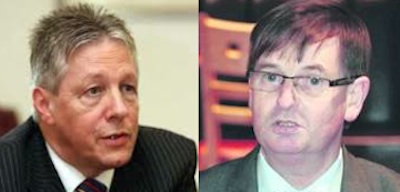
Unionists have sought to play down comments by US talks chair Richard Haass in which he blamed them for the failure to reach an agreement on his draft proposals dealing with the issues of flags and emblems, parades, and the past.
In a series of interviews, Mr Haass said he was “frustrated” that a deal had not been struck before the end of 2013. And after months of talks failed to reach even a face-saving partial agreement, he said the DUP, UUP and Alliance should justify their decisions not to endorse his proposals.
The document outlines seven new commissions and agencies to take on the issues which have dominated the political agenda in the Six Counties since the signing of the St Andrews peace deal in October 2006.
Sinn Fein’s ruling council is set to rubber-stamp the proposals this weekend, while the nationalist SDLP has also expressed its support for the blueprint.
Speaking on Friday, DUP leader Mr Robinson dismissed Haass’s comments and said he hoped direct negotiations between the parties could now get underway.
“Always remember that the responsibility did not lie with Richard Haass therefore he is not a failure - the political parties failed,” said the First Minister.
“They have to roll up their sleeves and renew the work until they find agreement.”
The Alliance Party also sought to defend itself. The party’s East Belfast MP, Naomi Long said: “I said we wouldn’t go into these talks to cook fudge and we wouldn’t sell fudge. However the proposal on flags was fudge to make a lack of deal more palatable to the public.”
The UUP, which described the agreement as 80 to 90 percent complete during the Christmas talks, this week flatly rejected the document. But party leader Mike Nesbitt said his party “remains committed to a positive outcome”.
“This means ensuring that victims are not disrespected, the rule of law is not disregarded and society is presented with a positive future,” he added.
Earlier this week, Sinn Fein’s Martin McGuinness said he believed extreme loyalists and “negative elements” in the Orange Order were dictating unionism’s response to the Haass proposals.
The deputy first minister’s comments came after DUP negotiator Jeffrey Donaldson confirmed he had held talks with loyalist ‘dissident’ Willie Frazer throughout the Haass process.
“As political leaders we have a responsibility to all citizens to deliver,” Mr McGuinness said.
The Mid-Ulster representative said “elements of the Orange Order and extreme loyalism” did not wish to see agreement and that they were hostile to the idea of a shared future.
“Adopting a negotiating strategy which is driven by these negative elements is a huge mistake,” he said. He insisted the negotiations had “ended” and that Haass had “delivered his final text”.
Calling on unionists to show political leadership, he urged them to “stand with the vast majority who want to see progress, not with the rejectionist elements within the Orange Order who wish to see this process fail”.
But he also said he did not intend to get involved in a blame game.
“I think that parties who have not yet come on board ignore at their peril the fact that the world is looking at us, the US administration is looking at us and more importantly, our own electorate is looking at us for leadership,” he said.
“Am I happy with everything that’s in the paper? No I am not but I am prepared to go with it.”
![[Irish Republican News]](https://republican-news.org/graphics/title_gifs/rn.gif)
![[Irish Republican News]](https://republican-news.org/graphics/title_gifs/harp.gif)

